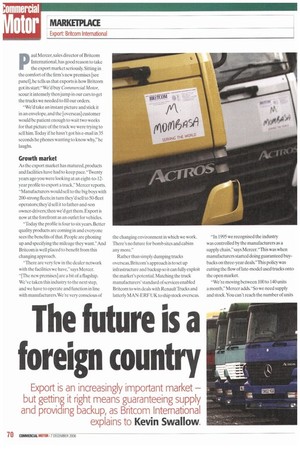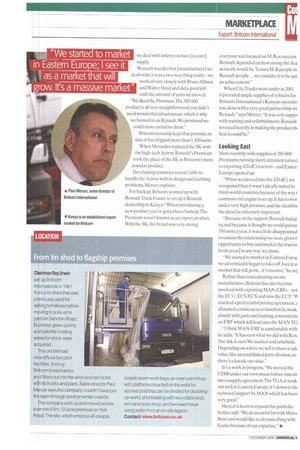The future is a foreign country
Page 72

Page 73

If you've noticed an error in this article please click here to report it so we can fix it.
Export is an increasingly important market — but getting it right means guaranteeing supply and providing backup, as Britcom international
explains to Kevin Swallow. paul Mercer, sales director of Britcom International, has good reason to take the export market seriously. Sitting in the comfort of the firm's new premises [see panel], he tells us that exports is how Britcom got its start: "We'd buy Commercial Motor, scour it intensely then jump in our cars to get the trucks we needed to fill our orders.
"We'd take an instant picture and stick it in an envelope, and the [overseas] customer would be patient enough to wait two weeks for that picture of the truck we were trying to sell him.Today if he hasn't got his e-mail in 35 seconds he phones wanting to know why," he laughs.
Growth market As the export market has matured, products and facilities have had to keep pace."Twenty years ago you were looking at an eight-to-.12year profile to export a truck," Mercer reports. "Manufacturers would sell to the big boys with 200-strong fleets; in turn they'd sell to 50-fleet operators; they'd sell it to father-and-son owner-drivers; then we'd get them. Export is now at the forefront as an outlet for vehicles.
"Today the profile is four to six years. Better quality products are coming in and everyone sees the benefits of that. People are phoning up and specifying the mileage they want."And Britcom is well placed to benefit from this changing approach.
"There are very few in the dealer network with the facilities we have," says Mercer. "[The new premises] are a bit of a flagship. We've taken this industry to the next step, and we have to operate and function in line with manufacturers.We're very conscious of the changing environment in which we work. There's no future for bomb sites and cabins any more."
Rather than simply dumping trucks overseas, Britcom's approach is to set up infrastructure and backup so it can fully exploit the market's potential. Matching the truck manufacturers' standard of services enabled Britcom to win deals with Renault Thicks and latterly MAN-ERF UK to ship stock overseas. -In 1995 we recognised the industry was controlled by the manufacturers as a supply chain," says Mercer. "This was when manufacturers started doing guaranteed buybacks on three-year deals:This policy was cutting the flow of late-model used trucks onto the open market.
"We're moving between 100 to 140 units a month: Mercer adds."So we need supply and stock.You can't reach the number of units we deal with unless you have [secure] supply.
"Renault was the first [manufacturer] we dealt with. it was a two-way thing really-we worked very closely with Bruce Allison and Walter Herd and did a good job with the amount of units we moved.
-We liked the Premium.The 385/400 product is all very straightforward; you didn't need wonderful infrastructure which is why we homed in on Renault. We promised we could move metal for them."
Britcom certainly kept that promise:to date it has shipped more than 1,500 units.
When Mercedes replaced the SK with the high-tech Actros, Renault's Premium took the place of the SK as Britcom's most popular product.
Developing countries weren't able to handle the Actros with its design and teething problems. Mercer explains.
For backup, Britcom teamed up with Renault Truck France to set up a Renault dealership in Kenya:"When introducing a new product you've got to have back up.The Premium wasn't known as an export product. With the SK, the brand was very strong; everyone was focused on M-B, so success Renault depended on how strong the dea network would be.To turn M-B people in Renault people... we consider it to be qui an achievement."
When City Trucks went under in 2001 it provided ample supplies of vehicles for Britcom International's Kenyan operatio was done with a very good partnership wii Renault," says Mercer. "It was very suppo with training and refurbishment. Renault invested heavily in making the product fill best it could be."
Looking East More recently, with supplies of 385/400 Premiums running short, attention turned to exporting 420 dCi tractors and Easter Europe opened up.
"When we moved into the 420 dCi, we recognised that it wasn't ideally suited to third-world countries because of the way t common-rail engine is set up. It has to wor under very high pressure,and the cleanlini the diesel is extremely important.
"Because of the support Renault had gi. us,and because it thought we could guarar 350 units a year, it was a little disappointed to sustain the relationship we were given ti opportunity to buy and market the tractor fresh areas] in any way we chose.
"We started to market in Eastern Euror we advertised it began to take off. I see it a: market that will grow... it's massive," he sa) Rather than concentrating on one manufacturer,Britcom has also become involved with exporting MAN-ERFs -not the EC11,ECS,ECX and now the ECT:"V reached a preferential pricing agreement, g allocated certain areas to function in, work closely with parts and training, concentratii on ERF which will lead onto the MAN TG think MAN-ERF is comfortable with he adds."It has seen what we did with Ren; The risk is ours.We market and refurbish. Depending on where we sell to there is adc value, like an established parts division, so there's a knock-on value.
It's a work in progress."We moved the F2000 under our own steam before enterin into a supply ageement.TheTGA is work out well in Eastern Europe; it's down to du technical support by MAN which has been very good."
Mercer is keen to expand the portfolio further still:"We do an awful lot with Mercc Benz and would like to do something with Scania because of our expertise." •
From tin shed to flagship premises
Chairman Ray Urwin sr* up Britcom Inlernational in 1981 frdm a tin shed that was previously used for selling tomatoes before meving to a six-acre yard on Sancton Road. Business grew quickly and satellite holding areas for stock were acquired.
The old site had niCe offices but poor facilities, forcing Britcom's mechanics and fitters out into the wind and rain to toil with its trucks and plant. Sales director Paul Mercer says the company couldn't have put the team through another winter outside.
The company sold up and moved across town into £4m,12-acre premises on York Road. The site, which employs 45 people, boasts seven work bays; an oven paint shop with platforms mounted on the walls for access (and that can be divided for doublingup work); shot blasting with recyclable shot; two-lane body shop: and two wash bays using water from an on-site lagoon.
Contact: www.britcom.co.uk


































































































































































































